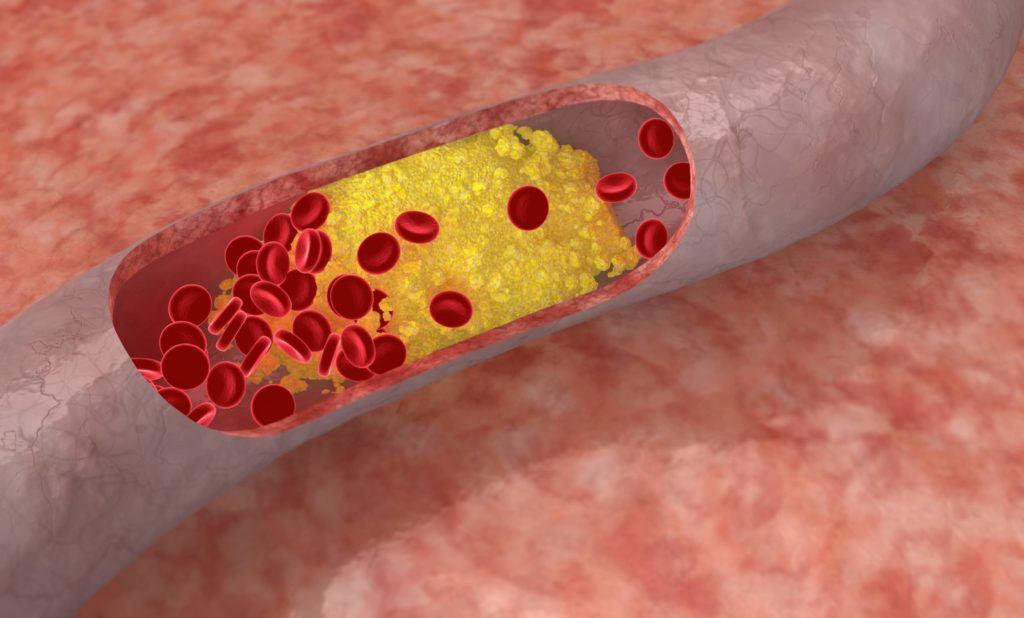Cholesterol and triglycerides are two forms of blood-borne fat that appear in the human circulatory system. People with too much LDL (“bad”) cholesterol or triglycerides in their bloodstreams can develop substantially increased risks for serious forms of heart disease. In a study published in December 2013 in the journal Alcohol, a team of Japanese researchers looked at the connection between LDL and triglyceride levels and occasional or habitual heavy consumption of alcohol. Does heavy drinking of alcohol affect triglycerides and cholesterol levels? This was the question the researchers wanted to answer. They found that even occasional heavy drinking can increase both triglycerides and bad cholesterol.
What Is Heavy Drinking?
Heavy drinkers exceed the commonly accepted public health recommendations for moderate alcohol consumption. The average man transitions from moderate to excessive drinking when he consumes five drinks or more in one day or 15 drinks or more in one week. The average woman makes the same transition when she consumes four drinks or more in one day or eight drinks or more in one week. Separate from any heart-related risks, heavy drinkers experience increased risks for developing diagnosable symptoms of alcohol use disorder (the mental health term for both alcohol abuse and alcoholism). As a rule, these risks rise as episodes of excessive alcohol consumption occur more and more often.
Cholesterol and Triglyceride Basics
Cholesterol comes in two main forms, known as LDL cholesterol and HDL cholesterol. The human body needs some LDL cholesterol in circulation in order to remain healthy; however, many people get much more of this substance than they require from dietary sources. HDL cholesterol helps diminish the risks associated with LDL cholesterol by removing some of the overage of this “bad” cholesterol from the bloodstream. People who have high amounts of LDL cholesterol and low amounts of HDL cholesterol in circulation typically have heightened chances of developing heart- and blood vessel-related ailments such as strokes, heart attacks and heart disease. Triglycerides are the main form of fat found in both foods in the human diet and in the human body itself. They appear in large amounts in the bloodstream when a person regularly consumes more fat than he or she requires at any given point in time, or as a consequence of certain uncontrolled physical ailments. Technically speaking, people with high triglyceride levels in their blood have a condition known as hypertriglyceridemia; the presence of this condition may contribute to the onset of a form of heart disease called coronary artery disease. Many of the foods with a high triglyceride content also have a high LDL cholesterol content.
Heavy Drinking of Alcohol Increases Triglycerides & “Bad” LDL Cholesterol
In the study published in Alcohol, researchers from Japan’s Hyogo College of Medicine assessed the effect of heavy drinking on a person’s LDL cholesterol levels, HDL cholesterol levels, triglyceride levels and overall buildup of blood-borne fats. They conducted this assessment with the help of a group of middle-aged men split into three categories: non-drinkers, occasional heavy drinkers and regular heavy drinkers. On the days they drank, both the occasional heavy drinkers and regular heavy drinkers consumed enough alcohol to exceed moderate intake by roughly 100 to 200 percent. The researchers came to several conclusions after comparing the cholesterol, triglyceride and overall blood-borne fat levels of the three participant subgroups. First, they found that in comparison to both non-drinkers and regular heavy drinkers, occasional heavy drinkers have unusually high levels of triglycerides and low levels of protective HDL cholesterol. They also found that both occasional heavy drinkers and regular heavy drinkers have significantly higher levels of “bad” LDL cholesterol and significantly lower levels of “good” HDL cholesterol than non-drinkers. In addition, they found that both types of heavy drinkers have substantially higher overall levels of blood-borne fat than non-drinkers. Interestingly, occasional heavy drinkers have higher blood-borne fat levels than regular heavy drinkers. In short, they determined, yes, alcohol significantly affects triglycerides and cholesterol levels.
Significance and Considerations
Both occasional heavy drinkers and regular heavy drinkers have higher cholesterol-, triglyceride- and overall blood-borne fat-related risks than non-drinkers. However, the authors of the study published in Alcohol note that the highest risks appear in occasional heavy drinkers, not regular heavy drinkers. In line with this finding, they stress the importance of avoiding any participation in heavy drinking. This will help you keep blood-borne fats in check and minimize the chances of developing serious problems with heart- or blood vessel-related disease. That’s not to mention your risk of developing an addiction will decrease dramatically. If alcohol is taking over your life, learn more about Promises Alcoholism Treatment Program. Call to speak confidentially with a Promises Recovery Advisor.

